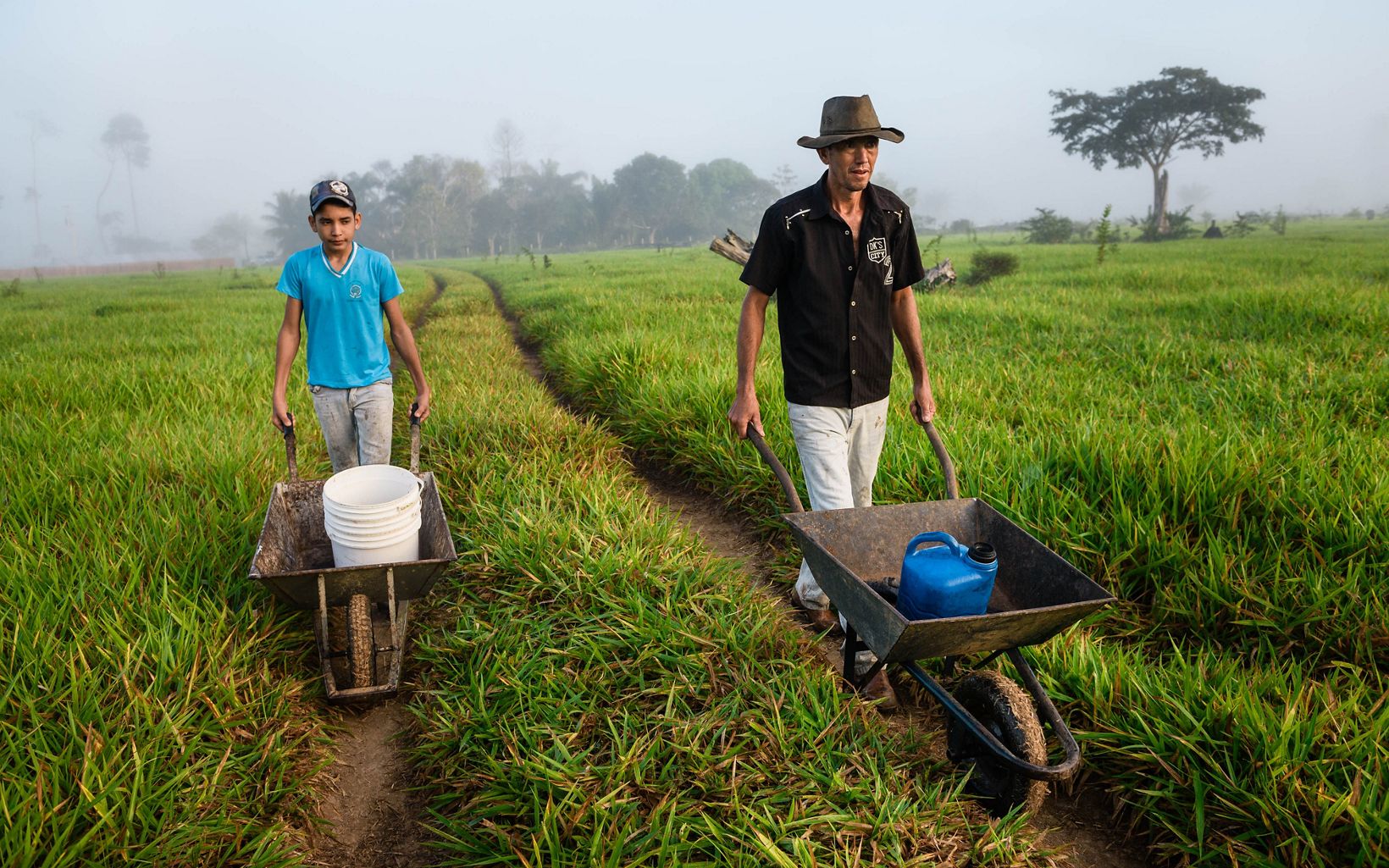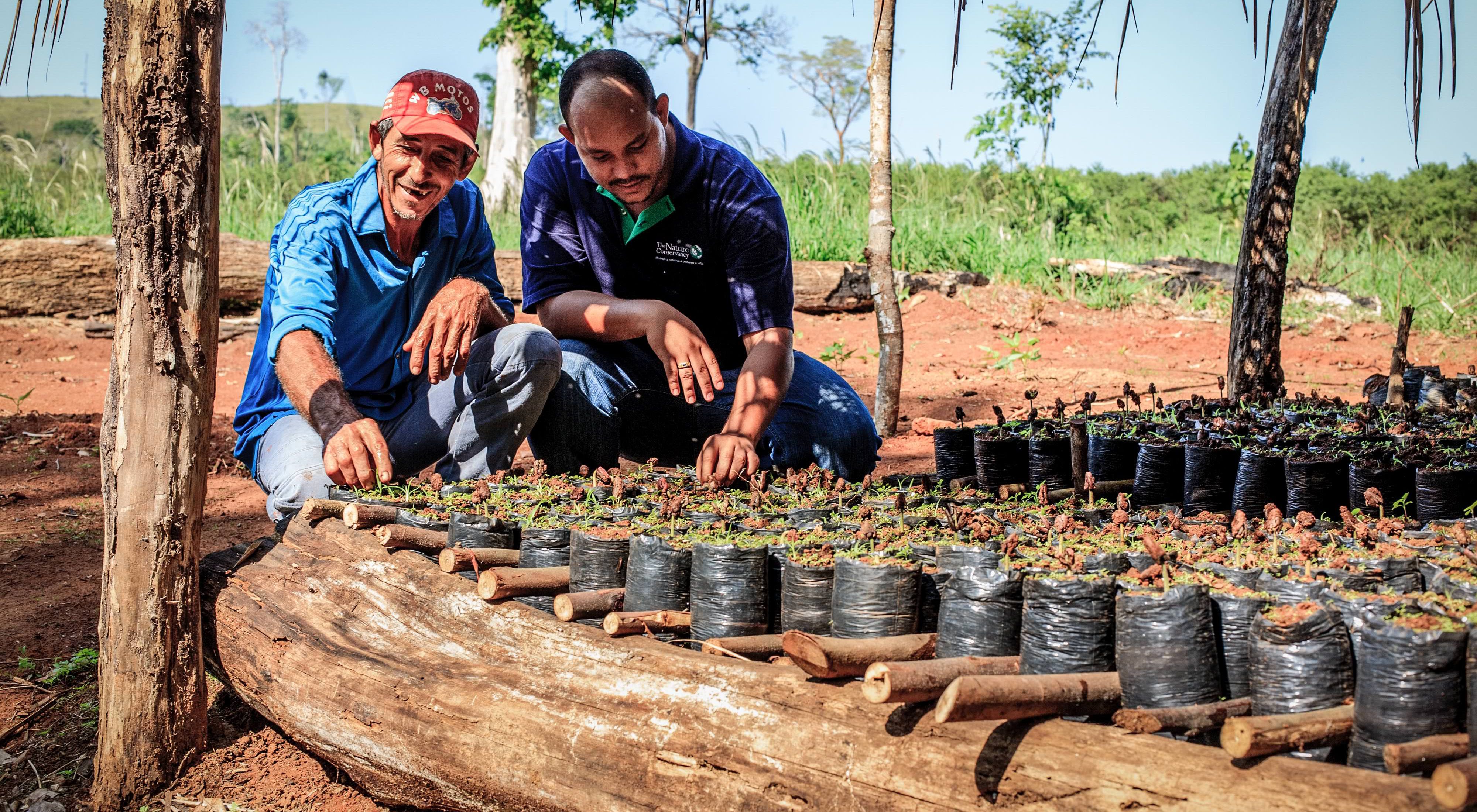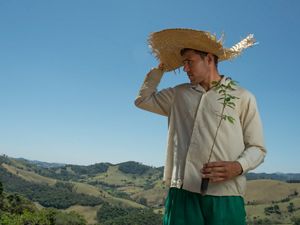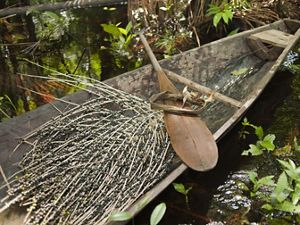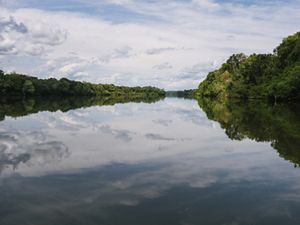The Nature Conservancy promotes ecological restoration in priority areas for water production and agricultural sustainability in Brazil.
Ecological restoration is the process of assisting the recovery of vegetation that has been degraded or destroyed in order to restore the health and integrity of the system. A major challenge is to achieve effective large-scale restoration through the adoption of cost-effective approaches. Forest and ecological restoration provide several ecological benefits, including reconnection of forest fragments, strengthening of green infrastructure, maintenance of biodiversity and genetic resources, increased forest cover and maintenance of environmental services (water and climate), apart from multiple socioeconomic benefits.
The Nature Conservancy (TNC) believes that benefits go beyond ecological aspects and encourages the creation of new economic opportunities through restoration activities that not only create jobs but also generate income for farmers and entrepreneurs who use economically attractive species in areas where this type of production is permitted by law.
Restoration, Water and Climate
Forests are essential elements of terrestrial green infrastructure and play a key role in the water cycle and climate stabilization. Despite these benefits, 30% of global forest cover has already been cleared and only 15% of primary forest remains. With respect to water resources, studies conducted by TNC and its partners show that the preservation and restoration of natural vegetation around springs and sources generate a positive return on investment in terms of water security, since they increase water flow and decrease treatment costs. With regards to climate, forests absorb CO2 from the atmosphere, principally during growth, contributing towards the mitigation of climate change.
The Experience of The Nature Conservancy
Since 2006, TNC has been developing ecological restoration actions with various partners in priority areas for water production and agricultural sustainability in the states of Minas Gerais, São Paulo, Paraná, Santa Catarina, Rio de Janeiro, Bahia, Espírito Santo, Mato Grosso, Mato Grosso do Sul, and Pará. The aim is to develop macro-regional strategies that contemplate the entire landscape, enabling the continued provision of environmental services, stimulating public policy, generating local employment and income, and fostering distinct links in the restoration chain, ranging from seed collection, seedling production, and the actual restoration of areas. The approval of the new Forest Code in 2012, it is expected that the demand for the restoration of native vegetation across Brazil will increase to an estimated 24 million hectares. To address this major challenge, TNC has carried out research to obtain a better understanding of the forest-restoration supply chain. That allowed us to develop strategic regional business plans, encouraging restoration not only from a compliance point of view, but also to generate economic benefits for rural property owners.
Quote
TNC develops and supports projects geared toward valuing forest products aimed at developing models of restoration that have the potential to generate economic benefits to farmers.
The Main Lines of Action
The recovery of forests is our main action to mitigate climate change. Forests are essential to regulate the water cycle, provide food, medicine and raw materials, improve air quality, and preserve biodiversity. Restoration can reduce global CO2 emissions by up to one third and help keep global warming below 2˚C.
Restaura Brasil is a campaign to mobilize people and companies to grow one billion new trees in several Brazilian biomes and to help the Brazilian government reach its Nationally Determined Contribution (NDC) target set through the Paris Agreement. Restaura Brasil is an online campaign to mobilize donors, and includes marketing partnerships with companies to engage employees, customers and suppliers as well as partnership with other NGOs and the Brazilian government to implement a restoration policy in the country. Strategic Forest Restoration Plans and Support for State Environmental Compliance Programs
TNC promotes the coordination and strengthening of public policies and executive arrangements to bring scale to projects and disseminate restoration manuals to guide the development of State Environmental Compliance Programs (PRAs,) and Strategic Forest Restoration Plans, which consist of a restoration supply chain assessment, identification of bottle necks and opportunities, and organization of the restoration agenda for each given region. To aid this process, TNC participates in the following entities: The Board of the Atlantic Forest Restoration Pact, the Ministry of the Environment working group on the development of the National Plan for the Restoration of Native Vegetation (PLANAVEG) and the Brazilian Climate, Forest and Agriculture Coalition.
New Restoration Technology and Monitoring
TNC pursues innovation in restoration methodologies aimed at increasing efficiency and reducing costs. Together with the Institute of Applied Economic Research (IPEA), the Brazilian Agricultural Research Corporation (EMBRAPA) and the Ministry of the Environment, is currently assessing forest restoration costs across Brazil taking into consideration the restoration approach, biomes and states. One of the aims of the survey is to optimize partnerships and increase the cost effectiveness of project implementation. TNC develops and supports projects geared toward valuing forest products aimed at developing models of restoration that have the potential to generate economic benefits to farmers. These projects involve the implementation of agroforestry and silvopastoral systems, planting of native species, and/or planting of native species interspersed with exotic species. Examples of these projects include Sustain the Forest, supported by the Brazilian Development Bank in the south of Sao Paulo state and north of the state of Parana, and the project Cacau Mais Sustentável (More Sustainable Cocoa), developed in São Félix do Xingu in the state of Pará.
Monitoring is a key component of the restoration process and is essential for evaluating activities and assessing whether changes are required to increase their effectiveness and reduce implementation costs. Based on their experiences in the field, TNC and other organizations and companies have developed a Monitoring and Restoration Protocol that considers indicators such as vegetation structure, composition and diversity, and has the approval of the Atlantic Forest Restoration Pact.
Dissemination and Capacity Building
TNC develops and organizes courses, training workshops, publications, educational materials and field days to enhance knowledge of restoration ecology. The main projects that are currently underway include: the national forest restoration training program, guides focusing on regional forest species, and various manuals and booklets on forest restoration for field technicians and farmers of specific regions.
Our Work in Pictures


